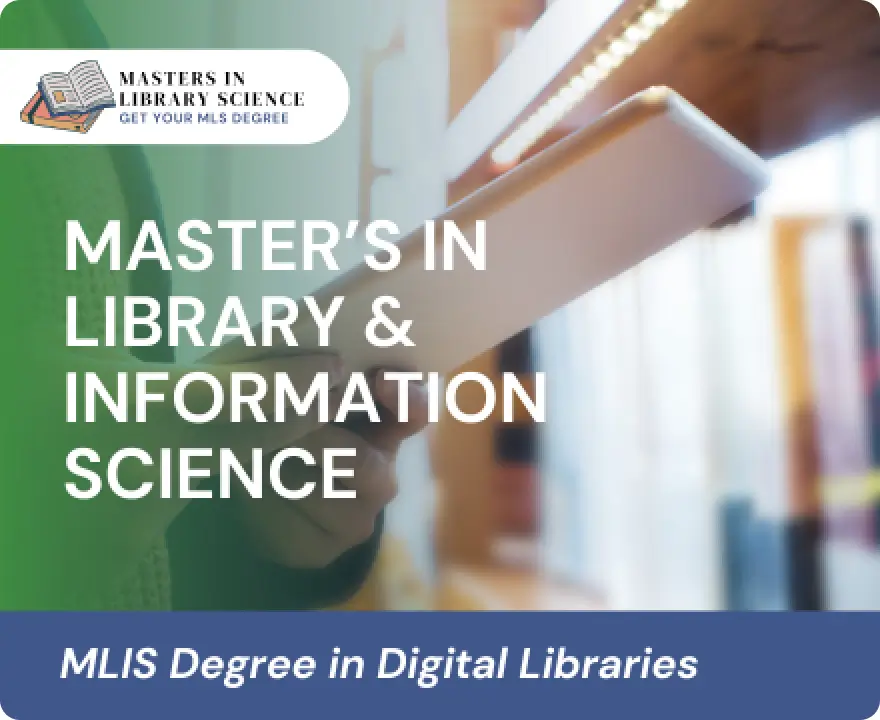Master's in Library Science in Digital Libraries Degree Online
Find the best online Digital Library Science MLIS program for you
- What is a MLIS in Digital Library Science?
- Admissions Requirements for a MLIS Degree in Digital Library Science
- What Classes Will I Take in a Digital Library Science Program?
- Careers in Digital Library Science with a MLIS Degree
- Online Digital Library Science MLIS Degree Programs
- Finding the Right Online MLIS Degree for Digital Library Science
What is a MLIS in Digital Library Science?
A Master’s in Digital Library Science focuses on the study and management of digital resources within library and archival contexts. This field emphasizes digital preservation, information retrieval, metadata standards, and digital curation, allowing students to gain expertise in handling digital content. As more libraries and cultural institutions digitize their collections, digital library professionals play a crucial role in managing this information, ensuring its organization, accessibility, and long-term preservation. In this specialization, students learn both traditional library science foundations and modern digital curation techniques. Coursework covers areas such as metadata, digital resource management, digital preservation strategies, and the development of online collections. Professionals in digital library science are essential for creating, managing, and preserving digital assets, making this degree ideal for individuals interested in the intersection of information science and technology. An online Master’s in Library Science (MLIS) with a specialization in Digital Libraries provides an essential education for those seeking careers in managing and preserving digital collections. With information increasingly moving to digital formats, this specialization equips students with the skills to organize, curate, and preserve digital resources, from databases and multimedia archives to digital manuscripts and online collections. Graduates are well-prepared to work in diverse settings, including academic libraries, corporate archives, government institutions, and digital museums, where they ensure that digital collections remain accessible and secure. If you are passionate about information technology and the preservation of digital resources, this program can lead to a rewarding and future-oriented career.
Admissions Requirements for a MLIS Degree in Digital Library Science
Admissions requirements for an MLIS degree specializing in Digital Library Science are generally similar to other library science programs, although some institutions may favor applicants with technology experience
- Bachelor’s degree from an accredited institution, in any field, though a background in computer science, information science, or library science can be beneficial
- Minimum GPA of 3.0 or higher
- Statement of Purpose detailing your interest in digital libraries and career goals
- Professional resume or CV showcasing any experience in libraries, archives, or technology-related roles
- Letters of recommendation (usually 2-3), preferably from academic or professional contacts who can speak to your skills and suitability for digital librarianship
- GRE scores (some programs waive this requirement)
- For international applicants, English proficiency scores (TOEFL or IELTS)
Candidates with technical skills, such as experience in digital asset management or database design, may have an advantage, though these skills are not always mandatory
What Classes Will I Take in a Digital Library Science Program?
An MLIS program specializing in Digital Library Science includes both core library science courses and advanced coursework in digital curation, preservation, and metadata management. Programs typically require 30-45 credit hours and may also include a practicum or internship that allows students to work directly with digital collections in a library, museum, or archival setting.
- Foundations of Library and Information Science
- Digital Preservation Techniques: Covers methods for ensuring long-term accessibility of digital resources, including formats, migration, and emulation.
- Metadata and Information Organization: Focuses on metadata standards, classification systems, and cataloging techniques for digital assets.
- Digital Curation: Teaches students how to curate and manage digital collections, ensuring that resources remain accessible and organized.
- Information Retrieval Systems: Explores the design and use of systems that allow users to locate digital information efficiently.
- Digital Libraries and Archives: Examines the principles behind digital libraries, including user access, collection development, and interface design.
- Legal and Ethical Issues in Digital Information: Addresses copyright, privacy, and intellectual property issues related to digital content.
- Database Management for Digital Collections: Provides knowledge in database design and management for organizing and storing digital materials.
- Data Analytics and User Behavior: Explores how data is used to analyze user interactions with digital collections, helping libraries improve accessibility and user satisfaction.
- Capstone Project or Practicum (optional): Allows students to work hands-on with a digital collection, applying their skills in a professional context.
The curriculum is designed to provide a strong foundation in digital curation, information retrieval, and data organization, preparing students to manage digital collections and create accessible, user-friendly resources for various institutions.
Online Digital Library Science MLIS Degree Programs
An online MLIS program specializing in Digital Library Science offers flexibility and accessibility for students who may be balancing work, family, or other commitments. Online programs mirror the curriculum of on-campus counterparts, with courses in digital preservation, metadata management, and database design. Interactive features, such as virtual lectures, discussion forums, and access to digital resources, make the online experience engaging and comprehensive.
Many online programs offer local internship options, allowing students to work hands-on with digital collections in nearby libraries, museums, or archives. This practical experience is crucial for those looking to apply their academic learning in real-world settings and is especially beneficial for online students who may not have access to a traditional campus environment. Graduates of online programs are often proficient in digital collaboration and remote work practices, which are increasingly valuable skills in the digital library field.
Finding the Right Online MLIS Degree for Digital Library Science
When selecting an online MLIS program in Digital Library Science, students should consider factors such as tuition, program length, accreditation, and career support. Tuition varies widely, ranging from $12,000 to $40,000, depending on the program. Financial aid, scholarships, and assistantships are often available to help offset costs. Program duration is another factor; full-time programs can often be completed in 1-2 years, while part-time options may extend the timeline for those who need greater flexibility.
In addition to cost and duration, it’s important to look at the career services and internship placement options that each institution offers. Programs with strong ties to digital libraries, archives, or corporate information centers may provide better networking opportunities and practical experience. Choosing the right program can pave the way to a successful career in digital library science, enabling you to manage, preserve, and make digital information accessible in a rapidly evolving field.
How Long Does It Take to Complete a Library Science MLIS Program in Digital Libraries?
Students pursuing a degree in Digital Libraries typically complete their program in 2 years of full-time study or 3-4 years part-time. Accelerated programs in this specialization may allow for completion in 18-24 months. Most programs require 36 to 42 credit hours, with a focus on digital preservation, metadata, and advanced information technologies.
Internship Requirements for Completing a MLIS in Digital Libraries
Internships for digital library students are often technology-focused, requiring work on digitization projects, metadata schema creation, and database management. Students typically complete 100 to 150 hours in institutions like corporate digital asset management firms, university libraries, or nonprofit organizations managing digital archives. These internships help students develop technical skills critical for roles in the rapidly expanding digital library field.
Careers in Digital Library Science with a MLIS Degree
Graduates with an MLIS in Digital Library Science are well-equipped for a variety of careers in libraries, museums, government archives, corporate collections, and beyond. Professionals in this field work to manage digital resources, ensure data security, and maintain user accessibility, with a wide range of roles available across multiple sectors. Below are some common career paths, along with average salary data and examples of organizations that hire for these positions.
- Digital Archivist: Digital archivists manage digital collections, including multimedia files, documents, and other online resources. They develop strategies to preserve these assets long-term and work to make them accessible through digital platforms.
- Average Salary for a Digital Archivist: $55,000 – $70,000 annually
- Organizations Hiring Digital Archivists: Academic libraries, corporate archives, government institutions, digital libraries
- Metadata Specialist: Metadata specialists organize digital resources by creating and managing metadata schemas, which help users find information quickly and efficiently. This role is crucial for maintaining well-organized and searchable digital collections.
- Average Salary for a Metadata Specialist: $55,000 – $75,000 annually
- Organizations Hiring Metadata Specialists: Digital libraries, museums, corporate information centers, national archives
- Digital Curator: Digital curators are responsible for organizing, maintaining, and presenting digital assets, such as online exhibits, multimedia collections, and digital records. They work closely with technical teams to ensure that collections remain accessible to the public.
- Average Salary for a Digital Curator: $60,000 – $80,000 annually
- Organizations Hiring Digital Curators: Museums, cultural institutions, academic libraries, digital archives
- Data and Information Analyst: Data and information analysts in digital libraries analyze user behavior, helping institutions optimize their digital collections for accessibility and usability. They use analytics to guide improvements to user interfaces and collection organization.
- Average Salary for a Data and Information Analyst: $60,000 – $85,000 annually
- Organizations Hiring Data and Information Analysts: University libraries, corporate libraries, government agencies
- Systems Librarian: Systems librarians focus on the technical aspects of library management, including overseeing digital library software, databases, and user interface designs. They ensure that digital collections are well-integrated with library systems and accessible to users.
- Average Salary for a Systems Librarian: $65,000 – $90,000 annually
- Organizations Hiring Systems Librarians: Academic libraries, public library systems, corporate archives, digital resource centers
- Digital Collections Librarian: Digital collections librarians curate and manage digital resources, often developing digital collections in specialized subject areas. They work on ensuring access, preservation, and user support for digital resources.
- Average Salary for a Digital Collections Librarian: $60,000 – $85,000 annually
- Organizations Hiring Digital Collections Librarians: Universities, historical societies, research institutes, public libraries
With the growth in digital resources and virtual collections, demand for professionals in digital library science is on the rise. Graduates are well-positioned for roles that require expertise in both digital technology and information science, making this specialization valuable across many sectors.

For those interested in these roles, an MLS in Archival Science provides essential skills and knowledge that employers value, particularly in fields dedicated to preserving and managing information for educational, historical, and cultural purposes.

Online MLS/MLIS Degrees
- Best Online MLS/MLIS Degree
- Archival Studies Degree Online
- Academic Librarianship Degree
- Children & Youth Services Degree
- Cultural Heritage Preservation Degree
- Digital Libraries Degree
- Law Librarianship
- Public Librarianship Degree
- School Librarianship Degree
- Book Arts Degree
- Music Librarianship Degree
- Records Management
